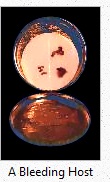|
|
|

I have
read your Guide to Psychology and your Chastity websites. A friend told me
about them but there seems to be quite a difference in response to questions.
Psychology shows empathy and concern while the other seems conditional and
almost impatient with the process. Why is there such a difference in response?
I think I want to be Catholic but these ideas might scare me away. Were you
always Catholic? If not, what were you? I am LDS [Mormon]. Somehow
your ideas don’t seem Catholic. Sorry. No disrespect.
 es, psychology and religion are
two very different approaches to life. es, psychology and religion are
two very different approaches to life.
The Objective
of Psychology
Psychology has (or should
have) the objective of nothing more than helping a person understand and
overcome the unconscious conflicts that interfere with mental health—that
is, such mental health as can be attained in a secular and largely pagan
world. For each person, the process takes a unique course, depending on personal
life-history. There can be no pre-conceived goals. All that matters is an
honest encounter with inner experience. And for that reason everything possible
must be done to encourage a person in the face of inhibiting fear.
The Objective
of Religion
Religion is a different matter.
It has very clear guidelines and objectives. Through
its Tradition, the Catholic Church has preserved
not just the Bible itself but also the very practices
of Faith that originated with the Apostles themselves.
Tradition has also grown and developed over time, not by changing with culture
but by responding to it through absolute fidelity to the spirit of Christ’s
own truth.
Sadly, many Catholics today have
lost all desire for the traditional devotion and
detachment from the world necessary to practice a
genuine Christian life. In fact, many Catholics today do not even understand
what Christianity is really all about.
Hatred for this
Website
I created this website to teach
the true faith as a prelude to the deep spiritual healing that far exceeds
mere psychological healing.
Consider, though, that many of
the persons who write to me on this website aren’t asking for help and
aren’t looking for empathy or concern. They complain that it is
judgmental and lacking in
compassion to speak to them about morality and
sin. They write in order to challenge me, just as
they unconsciously challenge God with their
defensive resistance to His will.
Let us beset
the just one, because he is obnoxious to us;
he sets himself against our doings,
Reproaches us for transgressions of the law
and charges us with violations of our training.
He professes to have knowledge of God
and styles himself a child of the Lord.
To us he is the censure of our thoughts;
merely to see him is a hardship for us,
Because his life is not like other men’s,
and different are his ways.
He judges us debased;
he holds aloof from our paths as from things
impure.
He calls blest the destiny of the just
and boasts that God is his Father. |
—Wisdom 1:12-16 |
They challenge me because the
hypocrisy they experienced in their families
as children has led them to perceive God as cruel, unfair, and playing games
with us. And yet, it was the parents who played games with the children.
Thus the children, in an unconscious psychological maneuver called
transference, shift their bitterness and frustration at their parents
to anger and protest at the Church.
Disrespect for
the True Church
Even you—even as you say
“No disrespect”—are really expressing a subtle disrespect
for the true Church. You say its “ideas” frighten you. Of course
you’re frightened. Your parents didn’t
teach you anything about true self-sacrificial
love and mercy. Instead
they intimidated you. In those circumstances, who wouldn’t be frightened
of the Cross? But if you run from it, where else
can you go?
Now, I fully understand that
many men and women in the Church are personally corrupt. They make it easy
for those who want to point their fingers in blame.
Just close your eyes and point, and you will find someone who is corrupt.
But the real Church is pure; it always has been,
and it always will be. The gates of the netherworld shall not
prevail.
Conversion by
the Eucharist
I was brought up with superficial
middle-America Protestantism. And though I
yearned in my heart for something—I
 didn’t know what—that touched on a true lifestyle of devotion,
I never saw it anywhere, not even in seminary. (But then, it was a Protestant
seminary, and I studied for academic, not ministerial purposes.) After seminary,
I thought I had found that devotion in some pagan practices. But finally
God got my attention through a profound pre-conversion process lasting several
years. One day during this process I read about a Eucharistic miracle in
which a Host turned into real human cardiac tissue, right in the hands of
the priest, gushing blood all over the
altar.[1] That was it.
“This is the real thing,” I thought. “The mystics really know
what they’re talking about.”
didn’t know what—that touched on a true lifestyle of devotion,
I never saw it anywhere, not even in seminary. (But then, it was a Protestant
seminary, and I studied for academic, not ministerial purposes.) After seminary,
I thought I had found that devotion in some pagan practices. But finally
God got my attention through a profound pre-conversion process lasting several
years. One day during this process I read about a Eucharistic miracle in
which a Host turned into real human cardiac tissue, right in the hands of
the priest, gushing blood all over the
altar.[1] That was it.
“This is the real thing,” I thought. “The mystics really know
what they’re talking about.”
|
These miracles
remind us that faith is the flesh of the Lord, and love is
the blood of Jesus Christ. When Christ, who is the Way and the Truth and
the Life, brought His Truth into the world for our
redemption from sin, He
paid a real price: His Passion and death. And so, if you receive Communion
in true faith, you, too, must pay a real price for the truth of Christ’s
Real Presence within you. You must pay the price of the total
surrender of your self in taking up your own
cross to follow Christ in the way of true
love. |
|
And, believe it or not, when
I came home to the Church I quickly learned that much of the persecution
I have to suffer comes from other so-called Christians, both Protestants
and Catholics. You, who are thinking of wanting to be Catholic, might keep
that in mind. If you really practice the
Faith, you will lose many of your current friends.
And Christ warned us about that. If it’s all easy and smooth, you’re
not on the Way of the Cross, you’re on the wrong road.
It’s quite a psychological
task to show someone that he is on the wrong road. I know, because I was
there on the wrong road myself for many years. My first
confession—a general life confession—took
over three hours. Not as bad as Moll Flanders, but long enough.
Souls Condemning
Themselves
And many souls today, many of
them already consecrated to Christ, are being
lost, condemning themselves by their own
behavior—by their own
disobedience—believing in their minds
that they are doing nothing wrong, and refusing to listen to all the warnings
that God, in his pure love, pours out on
them.
 Saint Catherine of Genoa,
for example, knew this most particularly because she lived through her own
mystical purgatory in this life. In experiencing first-hand the pain of souls
treating God’s love with indifference,
ingratitude, and contempt, Saint Catherine yearned to speak of God’s
most tender love “as I feel it within me, of its effects on me, and
of what it requires of him into whom it is infused.” She not only felt
love, but she knew as well that it required us, despite our fears,
to give up all that hinders its operations
within us: Saint Catherine of Genoa,
for example, knew this most particularly because she lived through her own
mystical purgatory in this life. In experiencing first-hand the pain of souls
treating God’s love with indifference,
ingratitude, and contempt, Saint Catherine yearned to speak of God’s
most tender love “as I feel it within me, of its effects on me, and
of what it requires of him into whom it is infused.” She not only felt
love, but she knew as well that it required us, despite our fears,
to give up all that hinders its operations
within us:
|
This love, which
rules and governs our will in order that it may grow strong and firm to resist
temptation, so occupies the affections and the intellect that they desire
naught beside. The memory is engrossed, and the powers of the soul are satisfied,
so that love remains her sole possessor and inhabitant, and she allows nothing
else to enter there. Love exhales a continual sweet perfume, by which man
suffers himself to be allured, and so powerful is this fragrance that however
great may be the torments through which he passes to salvation, there is
no martyrdom he would not suffer gladly to attain it. |
|
|
—Spiritual Dialogue,
Third Part, Chapter IV |
|

Notes
1. This was the Eucharistic miracle
in Lanciano, Italy, in the 8th century and now fully documented and
scientifically examined. Medical analysis identified the tissue as human
cardiac tissue, and the blood as the rare AB type, with the presence of hormones
indicating intense physiological stress. For more information about documented
and authenticated Eucharistic miracles, see
Eucharistic
Miracles from The Real Presence Association.
|




 didn’t know what—that touched on a true lifestyle of devotion,
I never saw it anywhere, not even in seminary. (But then, it was a Protestant
seminary, and I studied for academic, not ministerial purposes.) After seminary,
I thought I had found that devotion in some pagan practices. But finally
God got my attention through a profound pre-conversion process lasting several
years. One day during this process I read about a Eucharistic miracle in
which a Host turned into real human cardiac tissue, right in the hands of
the priest, gushing blood all over the
altar.
didn’t know what—that touched on a true lifestyle of devotion,
I never saw it anywhere, not even in seminary. (But then, it was a Protestant
seminary, and I studied for academic, not ministerial purposes.) After seminary,
I thought I had found that devotion in some pagan practices. But finally
God got my attention through a profound pre-conversion process lasting several
years. One day during this process I read about a Eucharistic miracle in
which a Host turned into real human cardiac tissue, right in the hands of
the priest, gushing blood all over the
altar. Saint Catherine of Genoa,
for example, knew this most particularly because she lived through her own
mystical purgatory in this life. In experiencing first-hand the pain of souls
treating God’s love with
Saint Catherine of Genoa,
for example, knew this most particularly because she lived through her own
mystical purgatory in this life. In experiencing first-hand the pain of souls
treating God’s love with